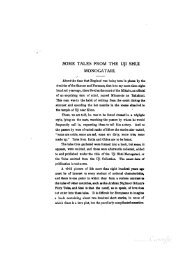Chau Ju-Kua - University of Oregon Libraries
Chau Ju-Kua - University of Oregon Libraries
Chau Ju-Kua - University of Oregon Libraries
Create successful ePaper yourself
Turn your PDF publications into a flip-book with our unique Google optimized e-Paper software.
IXTKODUCTIOX. 25<br />
This extract naturally suggests an inquiry into the general geographical<br />
knowledge <strong>of</strong> the Chinese concerning the world <strong>of</strong> the Barbarians in the time<br />
<strong>of</strong> this author. Fortunately he has left us a comprehensive and complete<br />
statement (the like <strong>of</strong> which is found in no other Chinese writer <strong>of</strong> the Sung<br />
5 period) <strong>of</strong> his notions on the physical and political geography <strong>of</strong> the world in<br />
his time. It reads as follows:<br />
«The Great (World)-encircling-Ocean-Sea bounds the Barbarians' coun-<br />
tries; in every quarter there are kingdoms <strong>of</strong> them, each has its peculiar<br />
products, each its trading centre (^ ^) from which it derives its(commer-<br />
10 -cial) prosperity. The (Barbarian) kingdoms due south have San-fo-ts'i as their<br />
commercial centre. Sh5-p*o is the centre <strong>of</strong>those to the south-east. The countries<br />
to the south-west are so vast in extent that they cannot all be described. The<br />
nearest are Chan-ch'ong and Chon-la as the commercial centres <strong>of</strong> Wa-li^<br />
(m. ^)- "^^ o^* distant is Ta-ts'in as the commercial centre <strong>of</strong> the coun-<br />
15 tries <strong>of</strong> Western Indian Among the distant ones Ma-li-pa^ (^ "^ :f^) is<br />
the commercial centre <strong>of</strong> the countries <strong>of</strong> the Ta-sM, and beyond these there<br />
same country Mo-k'ie-la (^ -^ |^).<br />
Wu-ssMi, asusedby<strong>Chau</strong> J u-ku a, is certainly Egypt;<br />
whether our author applies this name in the present case to the same country or to some other<br />
it is impossible to say. In another passage (SiS*) Ch6u uses three characters with the same sounds<br />
20 {'^ ^ ^) for Mosul (al Mawsil).<br />
1) <strong>Chau</strong> <strong>Ju</strong>-kua (infra, p. 54) mentions Wa-li as a dependency <strong>of</strong> Chon-la (Kamhoja).<br />
Chou K'ii-fei (2, 11") says it was 60 days journey from P'u-kan on the Irrawadi, without men-<br />
tioning any direction. It may have been either the Laos country or that <strong>of</strong> the Karens.<br />
2) The whole <strong>of</strong> Western Asia is sometimes covered by this term in Chinese works. For<br />
25 example in the modern work Hai-kuo-t'u-chl (30), Persia, Arabia, Syria and their ancient equi-<br />
valents are discussed under the heading <strong>of</strong> Si-Yin-t'u, i. e.. Western India.<br />
3) Ma-li-pa, or Ma-lo-pa as <strong>Chau</strong> also writes it, appears to be Merbat on the Hadramaut<br />
coast <strong>of</strong> southern Arabia. At the time <strong>of</strong> which our author writes, Aden was perhaps the most<br />
important port <strong>of</strong> Arabia for the African and. Arabian- trade with India and the countries beyond.<br />
30 It seems highly probable that the Ma-li-pa <strong>of</strong> the Chinese must be understood as including<br />
Aden— <strong>of</strong> which they make no mention whatsoever, but which was one <strong>of</strong> «the great commercial<br />
centres <strong>of</strong> the Arabs». In another passage <strong>of</strong> his work (3,2) Chou says that Ma-li-pa was<br />
reached from Lan-li (N. W. Sumatra) by ships sailing with the N. E. wind in some 60 days.<br />
It was also some 80 days by land from Mekka (Ma-kia). <strong>Chau</strong> <strong>Ju</strong>-kua says it was 120<br />
35 stages from Ma-lo-pa to Ki-tz'I-ni (possibly Ghazni) and 300 stages to Lu-mei (Rto,— Syria,<br />
Rome or Constantinople?). There is nothing in these indications which can help us locate this<br />
place. The ancient Merbat or Robat was, according to Theo. Bent (Geogr, Journ. VI,<br />
115—116, 124 — 125), near the modern Takha, about half way between Cape Risut and<br />
the modern Merbat. From Bent's examination <strong>of</strong> the locality, it had a good spacious<br />
40 and commodious harbor with an island protecting the entrance. It is, he says, the Abyssa-<br />
polis ('ApuffffaTToXii;) <strong>of</strong> Ptolemy, the Moscha (Mo'uxa) <strong>of</strong> the Periplus. Ibn Khaldun uses<br />
the name Mirbat. See also Mailer, Geogr. Graeci min. I, 282, § 32 and Mo Crindlo,<br />
Periplus, 95.

















